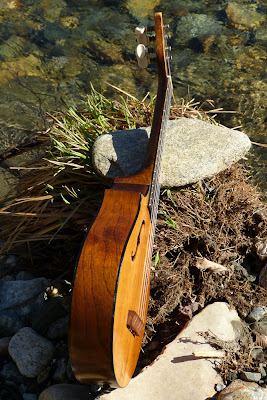c.1935 Regal "Two Point" Concert Ukulele
Clearly a take-off on the idea of the Roy Smeck "Vita" uke, this mid-30s Regal mando-shaped uke is definitely in the concert category with a 14 5/8" scale length. I worked on this one for a customer and the laundry-list of repairs included many hairline crack repairs (plus cleats), a crushed-top repair below the bridge, a fret level/dress, new (old parts) friction pegs, a new (old parts) bridge, cleaning, and setup. I also drop-glued the dowel-joint neck pocket to make it a bit more secure (the dowel was glued fine but the bottom of the heel was slightly loose).
The result of my labors is a beautifully-playing instrument with a lovely tone. It's similar to the Vita sound but has more of that forward Regal thing going on. Good volume, sweet overtones, and a good clear presence are what this is about. The board itself is also lightly radiused which gives it a fancier feel.
New bone nut. Faded Regal headstock decal.
I replaced the 12th fret dot with a pearl dot from my bin. The board is dyed maple. The top is solid spruce and the back, sides, and neck are all solid birch.
The f-holes are awfully cute! It's hard to see but there are a lot of hairline cracks clustered under them, however... a result of minimal bracing and stabilization around the f-holes from the factory.
There's a long hairline crack on the back that needed some cleating and fill to get it stabilized.
Though these tuners are period, they're not original. The original set wasn't full and had some damage.
I love the two-point body shape!
Some darn fool had previously installed a tailpiece and floating bridge on this instrument to attempt stringing with steel as a mandolin. That, obviously, failed (note the top cracks/fold from that attempt above the endpin). I installed this ebony endpin to cover-up the hole drilled for the tailpiece bolt.
The instrument has no endblock (it's a uke so, realistically, one can rely on the kerfing to keep the top in place) which meant that the tailpiece had been held in only by the thin wood of the sides. Years strung that way resulted in the folded-in top that needed repair.













Comments